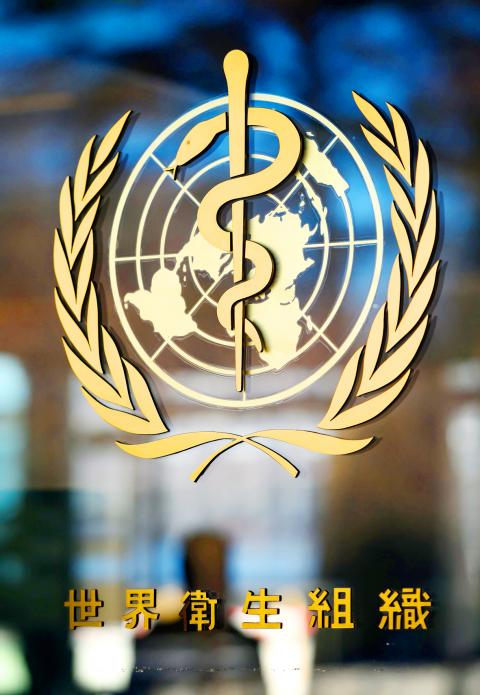China and the WHO are in the best positions to predict how the COVID-19 pandemic will develop, but most people do not trust Beijing and the WHO remains muted, Minister of Health and Welfare Chen Shih-chung (陳時中) said yesterday in response to queries by a foreign delegate.
During the Central Epidemic Command Center’s (CECC) daily news conference, Chen, who heads the center, shared a discussion he had with foreign representatives in Taiwan during a meeting at the Ministry of Foreign Affairs that morning.
He briefed them on Taiwan’s quarantine policy and next-stage border control measures, Chen said, adding that they expressed respect for the policies the nation had implemented.

Photo: AFP
One foreign representative asked him when the global outbreak might peak, but he told them that he could not make a forecast, Chen said.
“While we can see certain changes and trends, a definite end is not in view,” he said.
Only two parties can make such a prediction — China and the WHO, he said.
China has reported the world’s most confirmed cases and knows the most about how the disease arose, but its statements are not trusted by most people, Chen said.
The WHO can also make a judgement, yet it remains muted on the issue, despite having many health experts and a lot of documentation, he said.
His remarks about China and the WHO found agreement among the representatives, he said.
While Taiwan is not in a position to predict the disease’s future, the government would prepare as well as it could with a worst-case scenario in mind, he said.
Although Chen did not name any Chinese or WHO members at the news conference, Vice President Chen Chien-jen (陳建仁), an epidemiologist by training, on Wednesday criticized WHO Director-General Tedros Adhanom Ghebreyesus, and on Thursday said that the world health body’s declaration of COVID-19 as a pandemic was “too late.”
The Ministry of Foreign Affairs in a statement yesterday said that the delegates were from nearly 60 foreign countries and international organizations, and the meeting was attended by Minister of Foreign Affairs Joseph Wu (吳釗燮) and other officials.
Invited by Wu to conduct the briefing, Chen Shih-chung spoke about Taiwan’s border quarantine measures and travel warning standards, and said that the measures would be constantly updated according to the global situation, the statement said.
They lauded Taiwan’s effective and proactive action in containing the disease, its complete and flexible complementary measures, and its willingness to help those in need and share its successes with the world, the ministry said.

Nipah virus infection is to be officially listed as a category 5 notifiable infectious disease in Taiwan in March, while clinical treatment guidelines are being formulated, the Centers for Disease Control (CDC) said yesterday. With Nipah infections being reported in other countries and considering its relatively high fatality rate, the centers on Jan. 16 announced that it would be listed as a notifiable infectious disease to bolster the nation’s systematic early warning system and increase public awareness, the CDC said. Bangladesh reported four fatal cases last year in separate districts, with three linked to raw date palm sap consumption, CDC Epidemic Intelligence

Two Taiwanese prosecutors were questioned by Chinese security personnel at their hotel during a trip to China’s Henan Province this month, the Mainland Affairs Council (MAC) said yesterday. The officers had personal information on the prosecutors, including “when they were assigned to their posts, their work locations and job titles,” MAC Deputy Minister and spokesman Liang Wen-chieh (梁文傑) said. On top of asking about their agencies and positions, the officers also questioned the prosecutors about the Cross-Strait Joint Crime-Fighting and Judicial Mutual Assistance Agreement, a pact that serves as the framework for Taiwan-China cooperation on combating crime and providing judicial assistance, Liang

Reports of Taiwanese going missing, being detained or interrogated, or having their personal liberties restricted in China increased about fourfold annually last year, the Mainland Affairs Council (MAC) said yesterday. Last year, 221 Taiwanese who traveled to China were reported missing, were detained and interrogated, or otherwise had their personal freedom restricted, up from 55 the previous year, the council said. Reopening group tours to China would be risky, as it would leave travelers with no way to seek help through official channels after Beijing shut down dialogue between the associations tasked with handling cross-strait tourism, the MAC said. Taipei’s Taiwan Strait Tourism

SHIFT: Taiwan is evolving from a transit stop into a tourist destination, with more international travelers willing to spend on tours, dining and cultural activities Taiwan rose three places in the World Tourism Barometer to 36th globally in 2024, with international tourism revenue of US$10.028 billion, the Tourism Administration said on Monday. The UN Tourism Organization publication said that its focus has switched from whether a country has returned to pre-COVID-19 levels of tourism to the amount spent by a tourist during an overseas trip. The nation last year welcomed 8.57 million international tourists, about 9 percent more than in 2024, with most tourists coming from Japan, South Korea, and Hong Kong and Macau, all of which accounted for at least 1 million tourists each. During the first